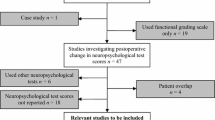Abstract
Purpose
The aim was to investigate the very long-term cognitive outcome in adults who had been shunt treated for hydrocephalus during their first year of life.
Methods
In a population-based series of 72 children born in 1967–1978 and shunt treated for infantile hydrocephalus, 43 were found to have a normal cognitive function when assessed at 6–17 years of age. Twenty-five of them agreed to participate in a follow-up study of cognition at a mean age of 35 years (range, 30–41 years). The Wechsler Adult Intelligence Scale (WAIS-III) was used.
Results
The median full-scale IQ was 101 (range, 83–120), median verbal IQ was 104 (81–115) and performance IQ was 99 (80–127). The corresponding IQs in childhood in the 16 subjects who had been tested previously with the WISC were 101 (84–124), 108 (86–135), and 101 (73–124). Specific cognitive deficits were found for working memory and processing speed. Shunt complications did not affect IQ.
Conclusion
This very long-term follow-up study of normally gifted children with hydrocephalus revealed that, as adults, they still had preserved cognitive functions despite recurrent shunt dysfunction. The results are encouraging and represent a tribute to neurosurgical intervention. Continued follow-up studies are needed since the etiological panorama and treatment procedures of children with hydrocephalus are changing over time.




Similar content being viewed by others
References
Boyer KM, Yeates KO, Enrile BG (2006) Working memory and processing speed in children with myelomeningocele and shunted hydrocephalus: analysis of the children´s paced auditory serial attention test. J Int Neuropsychol Soc 12:305–313
Dennis M, Fitz CR, Netley CT, Sugar J, Harwood-Nash DC, Hendrick EB, Hoffman HJ, Humphries RP (1981) The intelligence of hydrocephalic children. Arch Neurol 38:607–615
Fernell E, Hagberg B, Hagberg G, Hult G, von Wendt L (1988) Epidemiology of infantile hydrocephalus in Sweden: a clinical follow-up study in children born at term. Neuropediatrics 19:135–142
Fernell E, Hagberg B, Hagberg G, Hult G, von Wendt L (1988) Epidemiology of infantile hydrocephalus in Sweden. Current aspects of the outcome in preterm infants. Neuropediatrics 19:143–145
Fletcher JM, Brookshire BL, Landry SH, Bohan TP, Davidson KC, Francis DJ, Levin HS, Brandt ME, Kramer LA, Morris RD (1996) Attentional skills and executive functions in children with early hydrocephalus. Dev Neuropsychol 12:53–76
Heinsbergen I, Rotteveel J, Roelveld N, Groteniuws A (2002) Outcome in shunted hydrocephalic children. Eur J Paediatr Neurol 6:99–107
Hommet C, Billard C, Gillet P, Barthez MA, Maheut Lourmiere J, Santini JJ, de Toffol B, Corcia P, Autret A (1999) Neuropsychologic and adaptive functioning in adolescents and young adults shunted for congenital hydrocephalus. J Child Neurol 14:144–150
Iddon JL, Morgan DJR, Loveday C, Sahakian BJ, Pickard JD (2004) Neuropsychological profile of young adults with spina bifida with or without hydrocephalus. J Neurol Neurosurg Psychiatry 75:1112–1118
Lindquist B, Carlsson G, Persson EK, Uvebrant P (2005) Learning disabilities in a population-based group of children with hydrocephalus. Acta Paediatr 94:878–883
Lindquist B, Persson EK, Uvebrant P, Carlsson C (2008) Learning, memory and executive functions in children with hydrocephalus. Acta Paediatr 97:596–601
Lumenta CB, Skotarczak U (1995) Long-term follow-up in 233 patients with congenital hydrocephalus. Childs Nerv Syst 11:173–175
Persson EK, Hagberg G, Uvebrant P (2005) Hydrocephalus prevalence and outcome in a population-based cohort of children born in 1989–1998. Acta Paediatr 94:726–732
Scott MA, Fletcher JM, Brookshire BL, Davidson K, Landry SH, Bohan TC (1998) Memory functions in children with early hydrocephalus. Neuropsychology 12:578–589
Wechsler D (1980) Wechsler intelligence scale for children manual. The Psychological Corporation, New York
Wechsler D (1999) Wechsler adult intelligence scale-third edition. Manual Pearson assessment, Sweden
Yeates KO, Enrile BG (2005) Implicit and explicit memory in children with congenital and acquired brain disorder. Neuropsychology 19:618–628
Conflicts of interest
The authors declare that they have no conflict of interest.
Author information
Authors and Affiliations
Corresponding author
Rights and permissions
About this article
Cite this article
Lindquist, B., Persson, EK., Fernell, E. et al. Very long-term follow-up of cognitive function in adults treated in infancy for hydrocephalus. Childs Nerv Syst 27, 597–601 (2011). https://doi.org/10.1007/s00381-010-1311-y
Received:
Accepted:
Published:
Issue Date:
DOI: https://doi.org/10.1007/s00381-010-1311-y



